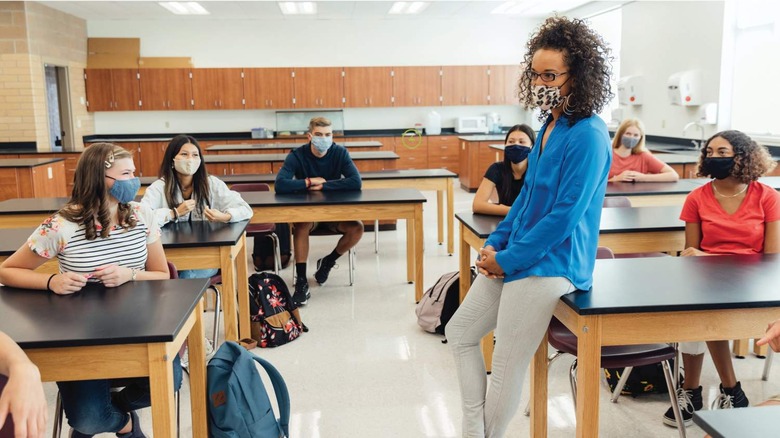Teen Pfizer COVID-19 Vaccine Good News Could Get Schools Reopened Faster
Pfizer-BioNTech's COVID-19 vaccine has proved impressively effective in adolescents, with newly-released study data making it seem likely that pandemic immunizations could safely expand. The Phase 3 trial set out to help address uncertainties around whether – as many have assumed over the past year or so – that young people are less prone to contracting dangerous cases of coronavirus.
That lack of clarity has led to contrary advice and confusion over whether it's safe to return young people to school, or if they should continue to do remote learning. While several COVID-19 vaccines have already been granted emergency use authorization by the US FDA, and are being deployed in America and abroad, currently they are only permitted for those aged 16 and above.
Pfizer-BioNTech's study looked, instead, at participants aged 12-15 years. In the trial, which included 2,260 adolescents, vaccinated participants who received the pharma companies' BNT162b2 drug showed 100-percent efficacy and "robust antibody response" they said today.
In fact, the vaccine appeared to be more effective than in previous trials. Those examined the response to BNT162b2 among participants aged 16-25 years.
In this newest trial, which was carried out in the US, 2,260 adolescents were split into placebo and vaccinated groups. 18 cases of COVID-19 were observed in the group that was not vaccinated; no cases were observed in the group that received BNT162b2. Side-effects observed were similar to those in the 16-25 age test, with the vaccine "well tolerated."

Meanwhile, Pfizer and BioNTech have already begun a new, global Phase 1/2/3 study on the efficacy of the vaccine on children aged between 6 months and 11 years of age. The 5-11 year cohort of that trial began dosing last week; the 2-5 year cohort will begin dosing next week.
From the early days of the COVID-19 pandemic, there have been arguments about just how prone – or otherwise – to infection younger people are. Initial claims that children "couldn't catch" coronavirus were debunked, with more nuanced understanding suggesting that while younger people tended to be less impacted by infection, they could still pass it on to others like adults with COVID-19 had.
Given the high potential for group spread in schools, therefore, many shifted to remote learning. That's proved to be a steady challenge for parents unused to also being teachers, leading to calls across US states for schools to reopen sooner rather than later. Earlier in March, the CDC altered its classroom social distancing rules, easing the recommendation for 6 feet of distance between individuals, but also drawing lines between the safety of younger children versus that of adolescents.
While today's results may be highly promising, there are still hurdles to pass before healthcare providers can start immunizing younger people in the population. The current vaccine is only authorized by the FDA for adult use. If it is to be expanded to adolescents too, that will require a modification of the original EUA, which the pharma companies say they intend to request.
"We plan to submit these data to FDA as a proposed amendment to our Emergency Use Authorization in the coming weeks and to other regulators around the world," Albert Bourla, Chairman and Chief Executive Officer at Pfizer, said today, "with the hope of starting to vaccinate this age group before the start of the next school year."
Once that request has been made, we've seen the FDA work fast to update its guidance and policies with previous alterations. Pfizer, for example, petitioned to have the rules around how its vaccine candidate was stored altered, after post-EUA trials suggested early instructions for extreme low temperatures may have been unnecessarily stringent. The FDA approved the update in February.
